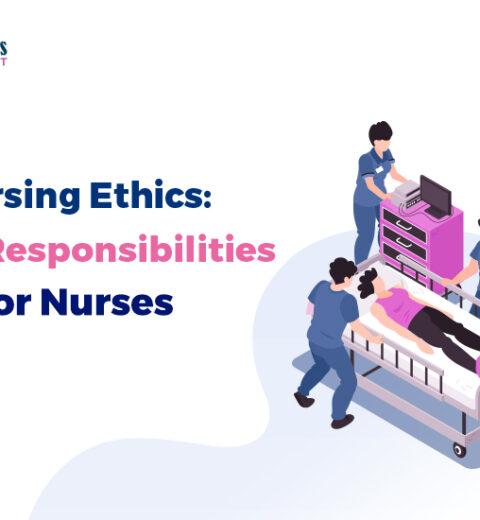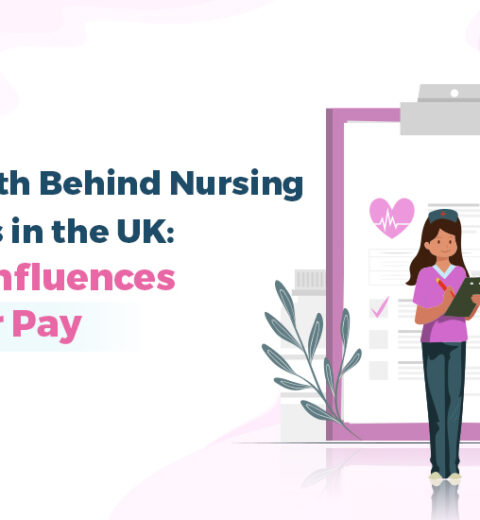Introduction
The continuous commitment of nurses is largely responsible for the prosperity of the healthcare industry. The nursing profession stands out as a shining example of compassion and knowledge in both the UK and the USA, providing vital care when it is most required. It’s crucial to comprehend the differences of nursing education and job options in these two different healthcare settings as demand for nursing experts continues to climb. Come along on this educational adventure as we contrast the significance of nursing, the rising demand for nurses, and the various career opportunities open to nursing hopefuls on both sides of the Atlantic.
Education and Training
UK

Nursing degree programs
In the UK, aspirants to the nursing profession frequently enroll in degree programs leading to the Bachelor of Nursing (BN) or Master of Nursing (MN) degrees. These courses offer a thorough education in clinical skills, nursing theory, and nursing practice.
Specialty nursing programs
Nurses in the UK have the option to specialize in a variety of fields, including mental health, pediatrics, or adult nursing. Additional training and certification are frequently required for specialization.
Licensing, Certifications, and Advanced Degrees
In the USA, nurses must pass the NCLEX-RN exam to become licensed, with additional certifications available for specialized roles. Many nurses also pursue advanced degrees like Master of Science in Nursing (MSN) or Doctor of Nursing Practice (DNP) for leadership positions and specialized practice.
USA
Different Routes to Becoming a Nurse
There are numerous routes to becoming a nurse in the United States. Licensed Practical Nurses (LPN), Registered Nurses (RN), and Advanced Practice Registered Nurses (APRN) are examples of these career paths.
Associate Degree in Nursing (ADN)
This degree, which normally requires two years to obtain, is the starting point for some prospective nurses.
Bachelor of Science in Nursing (BSN)
A different typical path is to pursue a Bachelor of Science in Nursing (BSN) degree. The four-year degree offers a more thorough education in nursing.
Licensing, Certification, and Advanced Degrees
In the USA, nurses must pass the NCLEX-RN exam for licensure. They can also obtain additional certifications for specialized roles, while pursuing advanced degrees like Master of Science in Nursing (MSN) or Doctor of Nursing Practice (DNP) is common for leadership positions and specialized practice.
II. Work Environment and Job Opportunities
UK:
National Health Service (NHS)
As the backbone of the UK’s healthcare system, the National Health Service (NHS) offers nurses a variety of employment in hospitals, clinics, and communities. Working here entails promoting the health and prosperity of the country.
Private Healthcare Sector
In the UK’s private healthcare industry, nurses can work in posh hospitals and clinics with prospects for competitive pay and a focus on providing top-notch medical care.
Care Homes, Nursing Homes, and Community Nursing
In the UK, nurses have diverse opportunities, including roles in care homes and nursing homes, where they offer vital care and support to elderly residents and individuals with long-term care needs. Additionally, community nursing emphasizes providing healthcare in patients’ homes, focusing on preventive measures and assisting those with chronic conditions in managing their health. These roles collectively contribute to comprehensive healthcare delivery in the community.
Job Prospects and Employment Benefits
UK nurses benefit from job security within the NHS and enjoy perks like pension plans, generous leave policies, and ample opportunities for career advancement.
Job prospects and employment benefits
USA
Hospital Settings
The USA’s healthcare tapestry offers nurses a rich array of roles within hospital settings. These encompass dynamic environments like fast-paced emergency rooms, where quick thinking is paramount, and highly specialized units like neonatal intensive care, where precision and expertise are the norm.
Ambulatory Care Centers (USA)
Outpatient Oasis: Nurses in the USA find rewarding opportunities in outpatient settings, which serve as healthcare oases for patients. These settings encompass primary care offices and specialized clinics, offering nurses a chance to deliver essential services to a diverse and dynamic patient population.
Home Healthcare
Home healthcare nurses make a significant impact by delivering care in patients’ homes, ensuring they receive the needed medical attention while remaining in the comfort of their familiar surroundings.
Long-Term Care Facilities
Working in nursing homes and assisted living facilities provides nurses in the USA with the opportunity to care for elderly residents, individuals with disabilities, and those requiring extended care.
Promising Opportunities
The USA’s strong demand for nurses translates into promising job prospects. Nurses in this region frequently enjoy substantial earning potential, especially when armed with advanced degrees and specialized certifications.
III. Nursing Practice
UK
Role of a nurse in the healthcare system
In the UK, nurses are essential in providing patient care. They are in charge of providing care, keeping track of patients’ health, and guaranteeing general wellbeing.
Responsibilities and scope of practice
Nurses in the United Kingdom have a wide range of responsibilities, including everything from giving treatments to coordinating care plans. Their duties include clinical chores, patient education, and emotional support.
Collaborative working with other healthcare professionals
Collaboration is ingrained in the UK nursing culture. Nurses work closely with physicians, therapists, and other healthcare professionals to deliver patient-centered care and make informed decisions.
Patient care delivery and coordination
UK nurses excel in patient care delivery, focusing on maintaining high standards of care and coordination, ultimately contributing to positive patient outcomes.
USA
Nursing roles and responsibilities
Nurses in the USA have diverse roles, ranging from direct patient care to specialized practices like nurse practitioners and nurse anesthetists. Their responsibilities may include assessment, treatment planning, and even leadership positions.
Nurse-patient ratio regulations
Nurse-patient ratios are frequently regulated in the United States to ensure that nurses can deliver focused, high-quality care to their patients, which is critical for patient safety and well-being.
Autonomy, Decision-Making, and Collaboration in Nursing Practice (USA)
Nurses in the USA, including those in advanced practice roles, benefit from a significant degree of autonomy in clinical decision-making, enabling them to provide patient-centered care. Additionally, interprofessional collaboration with healthcare professionals like physicians, pharmacists, and therapists is integral to ensuring comprehensive and holistic healthcare delivery.
Compensation and Benefits

In the UK, nurses benefit from a structured pay scale determined by NHS bands, with contributions to health and pension plans. They receive statutory annual leave and sick leave policies. Additional perks may include shift differentials and allowances.
In the USA, nurse compensation varies widely based on factors like location and experience. Employers often provide health insurance, retirement plans, paid time off, and maternity leave as part of their benefits packages, with potential for bonuses and tuition assistance.
The image below has more detail into the compensation and benefits UK and the USA nurses enjoy.
V. Professional Development and Career Progression
UK

In the UK, nurses have access to a range of continuing education and professional development opportunities, allowing them to enhance their skills and stay current in their field. Advancement in nursing careers often involves progressing through the NHS banding system, with options for specialization in areas such as pediatrics, mental health, or critical care. Moreover, nurses can aspire to leadership and management positions, contributing to healthcare decision-making and service improvement.
USA
On the other hand, in the USA, nurses are required to meet continuing education requirements to maintain licensure. Career advancement pathways are diverse, offering opportunities for nurses to become nurse practitioners or pursue advanced practice nursing roles. Additionally, some may choose to venture into roles as nurse educators or researchers, contributing to the development of future healthcare professionals and the advancement of nursing science. The USA’s healthcare landscape provides a dynamic environment for nurses to explore various career avenues and expand their horizons.
VI. Nurse-Patient Ratios and Quality of Care

UK
In the UK, nurse staffing levels are guided by national guidelines. These guidelines aim to ensure that hospitals and healthcare facilities have an appropriate number of nurses to provide safe and high-quality care. Adequate nurse-patient ratios have been linked to improved patient outcomes, including reduced mortality rates and shorter hospital stays. However, the UK healthcare system faces challenges in maintaining optimal staffing levels due to factors like budget constraints and workforce shortages. Efforts are ongoing to address these challenges and enhance nurse staffing to provide the best possible care to patients.
USA
In the USA, nurse-patient ratios are primarily regulated at the state level. Some states have implemented laws and regulations specifying the maximum number of patients that a nurse can care for at any given time. Numerous studies have explored the relationship between nurse-patient ratios and patient safety, with findings suggesting that lower ratios are associated with better outcomes. To address staffing issues and improve care quality, various initiatives and campaigns have been launched at both the state and national levels, advocating for safe staffing levels and the well-being of both patients and nurses.
VII. Work-life Balance and Job Satisfaction
UK
Working Hours: UK nurses often work in shifts, including nights and weekends.
Supportive Culture: Many UK healthcare settings prioritize employee well-being and mental health.
Job Satisfaction: Influencing factors include salary, workload, and the work environment.
Work Flexibility: Some opportunities for flexible schedules exist.
USA
Schedule Variations: Nursing schedules in the USA can vary widely, leading to potential work-life balance challenges.
Challenges: Achieving work-life balance can be demanding due to varying shifts.
Job Satisfaction Factors: Factors like pay, work conditions, and career development impact job satisfaction.
Flexibility Options: Alternative work arrangements and flexible schedules are available.
VIII. Cultural and Social Factors
UK
In the realm of nursing, cultural and social factors play a pivotal role in shaping the profession’s landscape in the United Kingdom (UK) and the United States of America (USA). In the UK, nursing is deeply influenced by a rich history of healthcare and a strong emphasis on socialized medicine through the National Health Service (NHS). This results in a healthcare system where access to care is relatively equitable, and nurses often work within a structured framework of national guidelines.
USA
Conversely, the USA’s healthcare system operates within a complex, multi-faceted landscape that includes public and private sectors. The American culture places a strong emphasis on individualism, which has implications for healthcare delivery. Nurse practice in the USA may vary significantly based on the specific healthcare setting and patient population served, leading to a greater diversity in nursing roles.
IX. Advancements in Healthcare Technology
UK
In both the United Kingdom (UK) and the United States of America (USA), the nursing profession is witnessing a transformative impact from advancements in healthcare technology. In the UK, the integration of digital health tools, electronic health records (EHRs), and telehealth services has become increasingly prevalent. Nurses in the UK utilize EHRs to streamline patient information, enabling more efficient and coordinated care. Additionally, the adoption of telehealth and remote patient monitoring technologies has expanded access to healthcare services, particularly in remote or underserved areas. Artificial intelligence (AI) is also playing a growing role in the UK’s nursing landscape, assisting in tasks like data analysis and predictive care.
USA
Meanwhile, the USA is at the forefront of technological innovation in healthcare. Electronic medical records (EMRs) have become standard practice in nursing, enhancing data accuracy and accessibility. Telemedicine and virtual care solutions have rapidly evolved, allowing nurses to provide remote consultations and monitoring. Robotics and AI applications are increasingly utilized to support healthcare delivery, including tasks such as medication administration and surgical procedures. Both countries are witnessing the profound impact of technology on nursing practice, contributing to more efficient, accessible, and patient-centered care.
X. Nursing Shortage and Future Implications
UK
Across the healthcare systems of the United Kingdom (UK) and the United States of America (USA), a significant nursing shortage has emerged as a pressing concern. In the UK, the shortage of registered nurses has been exacerbated by increasing demand, an aging nursing workforce, and challenges in recruitment and retention. The implications of this shortage are far-reaching, impacting patient care quality, increased workloads for existing nurses, and potential gaps in service provision.
USA
In the USA, a similar nursing shortage is evident, driven by factors such as an aging population requiring more healthcare services, an aging nursing workforce nearing retirement, and increased demand for nurses in various healthcare settings. The consequences of this shortage include increased nurse-patient ratios, potential burnout among nurses, and challenges in meeting the growing healthcare needs of the population.
Winding Thoughts – Nurses in UK or USA
In this comparative analysis of nursing in the UK and the USA, we’ve explored the similarities and differences in various aspects of these two healthcare systems. From education and training to practice, compensation, work environments, and healthcare technology, each country offers unique opportunities and challenges for nurses.
Aspiring nurses and experienced professionals should carefully consider their career goals and personal preferences when deciding where to practice. Both the UK and the USA provide fulfilling careers in nursing, but the path and context can vary significantly.
If you’re considering a career in nursing or seeking new opportunities, JP Medicals healthcare recruitment in the UK can be your trusted partner. Our agency specializes in connecting talented nurses with rewarding positions in both public and private healthcare sectors across the UK. Whether you’re seeking flexibility, career advancement, or a change of scenery, we’re here to assist you on your nursing journey.
Explore the possibilities, weigh the factors, and make an informed choice to shape your nursing career in either the UK or the USA. Wherever your path leads, your dedication to healthcare will make a profound difference in the lives of patients and their families.
Frequently Asked Questions (FAQs)
Can I practice as a nurse in the UK after training in the USA?
Yes, it is possible, but you may need to meet certain requirements and go through a registration process with the Nursing and Midwifery Council (NMC) in the UK.
Are there differences in salary and benefits between the UK and the USA?
Yes, there are differences. Nurses in the USA generally have higher salaries, but the cost of living and benefits can vary.
How does the nursing education system in the two countries differ?
In the UK, nurses typically complete a degree program. In the USA, there are various paths, including associate and bachelor’s degrees.
Is it easier to find a job as a nurse in the UK or the USA?
It can vary, but both countries have demand for nurses. It depends on factors like location and specialization.
Are there opportunities for international nurses in both countries?
Yes, both countries welcome international nurses, but they may need to meet specific visa and registration requirements.
What are the main challenges faced by nurses in the UK and the USA?
Challenges can include nurse-patient ratios, long working hours, and addressing the healthcare needs of diverse populations.
How does the nurse-patient ratio affect patient care in each country?
Nurse-patient ratios can impact patient outcomes. The UK has national guidelines, while the USA has state-level regulations.
What are the career advancement options for nurses in both countries?
Both countries offer opportunities for career advancement, including specialization and leadership roles.
Do nurses in the UK and the USA have the same scope of practice?
The scope of practice can vary based on regulations and state or country-specific guidelines.
How do cultural factors influence nursing practice in each country?
Cultural factors can influence patient interactions and care delivery, requiring cultural sensitivity and awareness from nurses.






